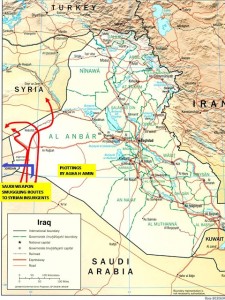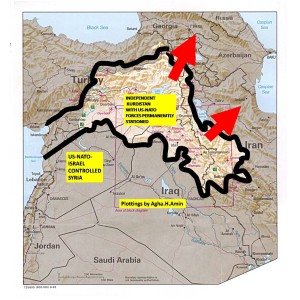Christof Lehmann (nsnbc) : Masoud Barzani, the President of Iraq’s Kurdistan Autonomous Region, and Osama al-Nujaifi, the vice president and head of the United Iraq or Mutahidun party, discussed the future of a post-ISIS Iraq. The Mutahidun party is seeking greater autonomy for predominantly Sunni areas.
![Osama al-Nujaifi, Iraqi Vice President and head of the newly-founded United for Iraq Sunni party [L] and Kurdish president Masoud Barzani discuss the future of Iraq on June 5, 2017 . Photo courtesy KAR Presidency.](https://www.jewworldorder.org/wp-content/uploads/2017/06/Al-Nujaifi_Masoud-Barzani_Kurdistan-Autonomous-Region_Iraq_Courtesy-KAR-Presidency_2017-300x186.jpg)
Osama al-Nujaifi, Iraqi Vice President and head of the newly-founded United for Iraq Sunni party [L] and Kurdish president Masoud Barzani discuss the future of Iraq on June 5, 2017 . Photo courtesy KAR Presidency.
The Presidency of Iraq’s Kurdistan Autonomous Region, on Monday, stated that Barzani and al-Nujafi discussed the political landscape of a post-ISIS Iraq, as well as the 2018 general elections, and the danger of the disappearance of the consensus and partnership pertaining Iraq’s regions and communities.
Political consensus as opposed to representative majority government, has been a guiding principle with regard to governing the country’s federal affairs since the formation of the Iraqi federal government after the U.S. invasion of the country in 2003.
The arrangement has meant sharing key governmental positions among representatives of the country’s main political, as well as ethnic and religious components. Whether the arrangements under this policy strengthened representative government in Iraq and its regions or whether it actually contributed to undermining representative democracy while oligarchical structures within clans and special interest groups usurped power is a question that is at the core of many debates about the future of Iraq and its regions.
Iraq’s post-2003 political system is not unlike that of Lebanon. Potential successes and failures in Lebanon provide a reasonable model for identifying potential successes and failures in the present and in a future Iraq.

ISIS routes to Syria via Al-Anbar since 2012. Map Plottings: Red, Agha H. Amin. Blue, Christof Lehmann.
The Shiite National Alliance, a coalition of Shiite parties, currently holds the Prime Ministry and key ministerial positions including the Interior and Foreign Ministries. Sunni factions hold the parliament speaker position and the important Defense Ministry. Kurds have the Presidency, but other key positions allocated to Kurds remain vacant, including the Finance Ministry after its minister Hoshyar Zebari was voted out by the Iraqi parliament last year.
A new initiative, supported by former Iraqi Prime Minister Nouri al-Maliki, head of Prime Minister Haider al-Abadi’s Dawa party, seeks to form a majority government. Kurds have strongly opposed this, perceiving it as opposed to the above mentioned post-2003 principles of governance. It is worth recalling that Kurdish, as well as Turkish, U.S.-American and Saudi elements played their roles in the removal of al-Maliki from office and at managing the “invasion of Iraq by proxy using ISIS”.
While supporters of the Iran and Shia leaning al-Maliki stress that he attempted to preserve Iraq’s sovereignty and territorial integrity in a situation where the country was facing a foreign-backed Sunni subversion and insurgency, others say his hard-liner position against Kurds and Sunni in Iraq aggravated the problems that are tearing the country apart.
The Kurdistan Democratic Party (KDP) has already announced that they may boycott Iraq’s elections next year, an unprecedented move by a major Kurdish party not seen since the fall of the Baath regime 14 years ago. Before the 2018 general elections take place, the Kurdistan Autonomous Region plans to hold a referendum on independence.
There are differences and there is positioning and posturing between the KDP, the PUK, the Change Movement (Gorran) and other parties in the Kurdistan Autonomous Region with regard to the referendum. However, the trend is clearly pointing in the direction of an independent Kurdish state within a timeframe of 1 – 10 years and with it the end to Iraq within the territorial borders that it has today.

The establishment of a Kurdish State with breathing straw access to the Mediterranean. Map plottings by Major (r) Agha H. Amin. (2012)
The vote is expected to be held in the fall and will include disputed areas claimed by both Baghdad and Erbil, almost all of which are located in Sunni areas, including Kirkuk and Nineveh.
The speaker of the Iraqi parliament, Salim al-Jabouri, a Sunni politician, said last month that they are standing in full force against any project that seeks to turn Iraq into “small states,” saying those who want to do so should seek life elsewhere.
“Iraq is one and will not be divided and anyone who seeks life outside this country should start looking for another country,” Jabouri said in a conference in Baghdad held for Iraqi Turkmens and attended by other politicians including Ammar al-Hakim, head of the ruling Shiite National Alliance. … “We will be absolutely against any idea of dividing or disintegrating the country under any name or excuse by this party or that, hiding behind and using the constitution to justify their ambitions and turning Iraq into small states at the mercy of regional wolves,” Jabouri declared, not mentioning any one party.
However, hard-liners like Jabouri and al-Maliki may indeed push many Sunni Iraqis who experience that their region is being overrun by Shia, Iranian-backed militia, under the name of the “war against ISIS” to seek greater independence from Baghdad. Several prominent Sunni politicians from Mosul have already called for a regional government in Nineveh similar to that of the Kurdistan Autonomous Region.
CH/L – nsnbc 06.06.2017
NSNBC INTERNATIONAL is financed by small monthly donations from readers like you. The donate button is in the column to the right of this article. Thank you for your support.
Source Article from https://nsnbc.me/2017/06/06/barzani-and-al-nujaifi-discussed-future-of-post-isis-iraq-and-sunni-autonomy/
 RSS Feed
RSS Feed















 June 6th, 2017
June 6th, 2017  Awake Goy
Awake Goy 










 Posted in
Posted in  Tags:
Tags: 













